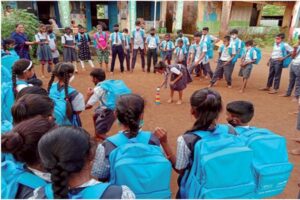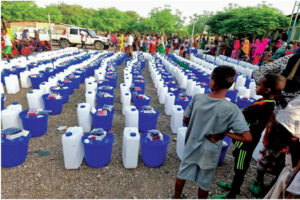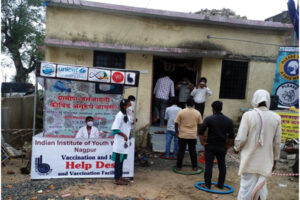
Maharashtra is one of the highly urbanised states, with approximately 50.82 million inhabitants in the urban area. The state has faced severe disasters such as the Latur earthquake in 1993, the Deluge in 2005, Pune Landslide in 2014, the Kolhapur-Sangli floods in 2018, Cyclone Nisarg and Taukte in the Konkan Region, multiple building collapses and fires in the largely unplanned city of Mumbai. Maharashtra was also the worst-hit state by the COVID-19 pandemic with nearly 6.6 million reported cases to date, write Sarbjit Singh Sahota, Emergency Specialist Disaster Risk Reduction Section, UNICEF India, Yusuf Kabir, WASH Specialist, UNICEF and Omkar Khare, State Consultants, UNICEF India.

Yusuf Kabir, WASH Specialist, UNICEF

Omkar Khare, State Consultants, UNICEF India
In the unique situation of the pandemic and the lockdown, Maharashtra faced a large migrant movement where over 2.5 million migrants tried to return to their home states. Since the public transport was closed due to the nationwide lockdown, even the simple activity of going home, was a herculean task. As many as 17 migrants lost their lives on their quest to reach home. The Government was already occupied with responding to medical emergencies. The Government took leadership to absorb support from multi-lateral agencies, the Civil Society, UN agencies and the INGOs to deal with the cascade of the direct and indirect impact of the COVID-19 pandemic. The migrants were walking, cycling, waiting in long queues (of thousands) outside the railway and bus stations to go back home not sure of the availability of food, water, security, etc.
In this unprecedented situation, UNICEF Maharashtra initiated a multi-agency platform to support migrants. The idea was to provide “Relief and Wheels” the “Jeevan Rath” (JR) (Chariot of life) programme was rolled-on. Small trucks with nutritious food and water supplies, clothes, footwear, medicines, sanitary napkins, ORS, etc. were moving around where such citizens flocked. More than 35 partners which included Government agencies, NGOs, and innovators came together to mobilise resources and streamline strategies for this intervention. The Rath reached over 1,50,000 citizens across the state.


Distribution of NFI kits in Ratnagiri district
In the second phase (JR 2.0) and the third Phase (JR 3.0), the Rise Infinity Foundation (RIF) was the designated secretariat for the Collaboration which had grown to 65 plus partners, who were committed to saving lives from COVID-19 and other emergencies such as floods, landslides etc. A call centre was established to track migrants so as to ensure that the migrants had reached home safely was one of the numerous impactful interventions. 74,000 migrant citizens were assisted to reach their homes by flights or buses across nine states. Food, water, medical supplies, ration kits, and other essentials were provided during the travel by all the partners. UNICEF was privileged to such committed partners. The vision was now established to “reach the unreached”. Skill mapping and capacity building were also initiated to assist the unskilled/semi-skilled workforce recovery.

Education kits to school children in COVID and flood affected areas
Additionally, UNICEF and this collaboration have also facilitated the URBAN WASH COVID response program for saving lives from COVID. Handwash was promoted and pedaloperated handwash stations were installed in slums which were effectively used by over 3 million people and built their safety towards COVID. Support for COVID-19 resilient handwash infrastructure was provided to government offices, health centres, public toilets, and community places.

Maha Peco Net: Direct initiative for saving lives and minimising risk
In 2021, the Jeevan Raath collaboration was transformed into an NGO platform called the Maharashtra PECO Network (Maha-PECO-Net). The Maha-PECONet has over 77 development partners who are committed to saving the lives of people during emergencies. The platform is governed by a Governing Council and has a General Body. In addition to the Rise Infinity Foundation, YUVA is also a part of the secretariat and both the organisations jointly look after administrative and programmatic issues. Localising from the Global Grand Bargain and the SDG 11.5.1 and 11.5.2 the platform envisions, ensuring assistance to the unreached and building resilience for marginalised and vulnerable groups during, before and after emergencies through risk-informed development programming including mitigation, adaptation and effective disaster response to minimise life loss.

Distribution of WaSH supplies in the flood affected areas (Raigad District)
The platform has responded and worked towards recovery post-Cyclone Taukte, Maharashtra floods in August 2021 while already contributing towards COVID-19 recovery. The platform has reached out to over 20 million people in need. The second wave (COVID-19) started impacting Rural Maharashtra, the platform led a pilot project across 300 Gram Panchayats and technically supported the village level COVID-19 management committees. These committees are now evolving into Disaster Management Committees for routine Risk-Informed Planning and community-based emergency preparedness for response.
After the second wave, the platform took on the challenge of addressing the recovery needs of the poor and marginalised and converting vaccine hesitancy of the communities to vaccine eagerness. The platform conducted various innovative activities like walk the talk, health awareness help-desk, RCCE in local tribal languages, etc. People were also assisted to register on the CoWIN portal for vaccination and the elderly and disabled population was also provided with physical assistance to visit the vaccine centres.
To overcome vaccine hesitancy, the platform got together all the FaithBased Organisations (FBOs) and CBOs in four districts of Maharashtra. Various digital and physical means were used for awareness generation. FBO teams were mobilised for awareness generation about vaccination. Mask distribution, support to local governments for vaccination was also provided through the FBOs.
Strategic policy assistance to the Government through the platform for preparedness
A COVID-19 Surge (human resources) Support was rolled out by the UNICEF Maharashtra Field Office in collaboration with RedR India in the month of April 2021 to support the urban local bodies (ULBs) and district administrations. A team of nine experts in Public Health and Risk governance is deployed at the state and three divisional levels. The deployment has demonstrated effective assistance to local governments for decentralised decision support through the real time data analysis of COVID-19 cases, understanding emerging needs and effective utilisation of available health facilities and other resources. The team had a significant role in promoting localised campaigns of promotion of CAB and vaccination.

Crowd management at the COVID vaccine centre and Health Awareness Help Desk in Nagpur
Micro-analysis for vaccination data analysis till block and villages for the low-performing vaccination areas and state-level vaccination forecasting tool are some of the elements of success. Gap analysis for Oxygen availability and planning to fill those gaps is being done consistently at the local level. Yet another successful initiative is the city level GO-NGO coordination platform for promoting risk communication and community engagement to leverage social capital for addressing COVID-19 risk.
The platform approach to working and its success has taught us that ‘Risk is invariably extensive, but resilience is always local. In the spirit of Grand Bargain Commitments, UNICEF and partners continue to work towards localisation of capacity to remain prepared and ready to respond to disasters.
Be a part of Elets Collaborative Initiatives. Join Us for Upcoming Events and explore business opportunities. Like us on Facebook , connect with us on LinkedIn and follow us on Twitter, Instagram.











